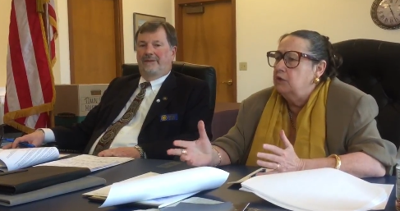The 2021 Oregon Legislature is under way at the capitol building in Salem, but this session is far from normal. It is marked by pandemic related issues and restrictions and a $1.7 billion budget shortfall.
By far, the top issue is the COVID-19 vaccine, according to Sen. Betsy Johnson.

Rep. Brad Witt and Sen. Betsy Johnson at a previous Columbia County town hall meeting. Photo / The Chief
“We have heard both pro and con about the vaccine,” Johnson said. “Some people are desperate to get it and I have heard from an enormous number of people opposed to the state mandating the vaccine. This is issue number one.”
Johnson said the second top issue are schools and resuming in-person instruction.
“When they will reopen and under what conditions and issue number three is when will the government let the business community fully reopen,” she said.
Johnson told The Chief she has her own three top priorities.
“Budget, budget, budget,” she said. “I am one of the three budget committee chairs writing the budget and we are in the process of trying to figure out what the budget will look like. We have as many unknowns as knowns.”
According to Johnson, the ‘knowns’ are the pandemic and the recent summer and fall wildfires. She said legislators are starting the budget discussion noting that the state is $1.7 billion short in the general fund to continue current programs and services.
“The good news is that Oregon has taken steps to be prepared for the financial shortfalls,” she said. “We are one of the best situated states to be prepared. We have a rainy-day fund and an education stability fund that holds $1.3 billion in reserve.”
Johnson said the ‘unknowns’ will be the key challenge.
“We don’t know how quickly the vaccine is going to get out to most Oregonians and what will lead to the elimination of the pandemic restrictions,” she said. “We don’t know when the state, national and global economies will reopen, and we don’t know when the recovery will actually begin. We don’t know the changes in federal support and the program requirements that may come with the federal support.”
Johnson said another key unknown is what the financial impact of new programs, notably Ballot Measure 110, that decriminalizes all drugs and changes how the state conducts recovery.
“And because of that we can’t address right now what hasn’t happened,” she said. “We are trying to lay out some guiding principles to address the shortfall and evaluate programs to see what is working. We have a very discipline approach to evaluate long term investment in infrastructure and programs.”
Johnson describes herself as exclusively a budgeteer, but she told The Chief she does have one specific bill that she believes would be a good alternative to the landlord tenant bill that was passed in the third special session in 2020.
“That is Senate Bill 330, which provides tax credits to landlords, immediate relief to tenants and it relieves the chance of a lot of lawsuits, and it can be implemented over a time horizon that is more particable for our budget situation,” Johnson said.
The pandemic limitations on how people can participate in the legislative process is also troubling, according to Johnson.
“How are we going to conduct a virtual session? We could have 3,000 bills introduced this session, but the public is not allowed in building due to the pandemic,” she said.
Seeing the capital building closed and the recent huge blocks of concrete and fencing surrounding to building to protect from organized demonstrations is discouraging, according to Johnson.
“It has broken my heart,” she said. “I have been amazed over the years how open and accessible the public legislative process has been. I simply do not know how the public is going to react to the many bills that we are contemplating with an unfamiliar legislative process.”
Oregon House
Rep. Brad Witt, who represents the area district, said from the public calls his office is receiving, the top three issues his constituents are concerned with are:
- The pandemic
- The economic fallout caused by the pandemic
- Vaccine and COVID-19 testing availability
“My top priorities are to continue to ensure that Oregonians receive the unemployment benefits they are due, that businesses have the tools and capability to safely remain open during the pandemic, that schools can safely reopen, and that rural communities such as those in my district receive the same vaccine and test availability as the metro area,” Witt said.
Legislators have been told that the Capitol will be closed to the public at least through March, according to Witt.
“However, I believe the public may have a greater and more convenient option to participate in the committee process this session through the use of video conferencing,” he said.
Witt said benefits of using this platform include citizens not having to take a day off of work to drive to Salem to testify or try and schedule childcare.
Witt said he was even able to hear testimony from a scientist in Sweden. He added that telephone testimony is also an option for the public wishing to testify about specific legislation.
To reach Rep. Brad Witt call 503-986-1431. To reach Sen. Betsy Johnson, call 503-986-1716 or 503-543-4046.
Date: 2021-01-29 08:21